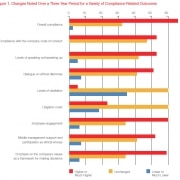Risk Management and Ethical Systems Design
Recently the Wall Street Journal featured a conversation with Henry Ristuccia, a partner at Deloitte and global leader for Governance, Risk and Compliance Services, speaking on the subject of reputational risk management. The key takeaway: reputation is considered the highest impact risk area to business strategy.
Ethical systems design is imperative from a risk management point of view. Companies with a strongly aligned ethical culture (and a reputation for such a culture) will be viewed more favorably in all their strategic endeavors, and they will be less likely to commit transgressions that damage their good name. Ristuccia talks about how reputation is shaped outside the organization, but in truth it begins closer to home, with the perspectives of executives, managers and employees within the company. Corporate behavior becomes part of the reputational infrastructure and permeates every aspect of a business, both internal and external. If a company wants to have a solid reputation, it should start with solid ethics.


